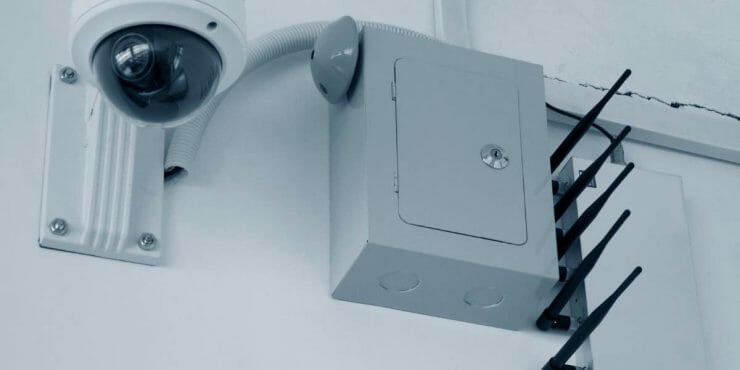Quick Navigation
- 1. Talk to Your Neighbor About Repositioning the Camera
- 2. Plant Growing Trees and Shrubs
- 3. Install Film on Your Windows
- 4. Invest in a Powerful Light Facing Towards the Camera Lens
- 5. Ask Help from a Third Party or Mediators
- 6. Contact a Lawyer and the Authorities
- 7. Invest in a Camera Jammer
- FAQ
- What You Need to Know
Sometimes we have a nosy neighbor that just won’t listen to reason and records us on our own property no matter what we do. No one wants to be walking out in their backyard in their bathrobe and be afraid that someone is taking a video.
We go through below the top methods to block neighbor’s security cameras from taking footage that may be sensitive and explicit to you. We cover some great initial methods and then move on to the legal methods and what you can do if nothing else works.
1. Talk to Your Neighbor About Repositioning the Camera

It’s always preferable to talk to your neighbor first if you believe their security camera intrudes on your privacy. There might be a chance that they are just completely unaware that their camera is taking footage of your property. They may just be trying to secure the boundaries of their home and just have not addressed the fact that your property is visible.
So, before you make any possible harmful conclusions, first talk to your neighbor in a respectful, non-accusatory manner. Ask as to why your neighbor positions his camera at that angle. Then say something about the camera your neighbor directs towards your house. Politely ask them to change the angle or shift the direction of their security camera.
If they say that the camera can’t see your private areas, but you have reason to believe it can, you may request to see taken footage. Taking a look at an actual tape yourself has to be a simple method to resolve the conflict.
If they decline to share their footage, this could indicate that they are not telling the truth, but this isn’t always the situation. You may still request your neighbor to move their camera from your property in this case. If your neighbor still refuses, you can stop because this method does not apply to you. In this case, you will need to follow the other procedures.
2. Plant Growing Trees and Shrubs

If your neighbor feels uncomfortable talking to you or may not be that social type of person, then an alternative solution is planting trees in your yard. This solution applies both ways if talking is not an option for you.
You may conceal your windows and private rooms where your neighbor points his camera by planting tall shrubs or growing trees. These trees or shrubs on your property will blind your neighbor’s security camera. The more grown your planted trees and shrubs become, the greater your privacy will be.
Using a shade or curtains is also an excellent idea. However, we are eco-friendly people who prefer to think outside the box, so we grow trees and shrubs.
This method will indeed block your neighbor’s security camera view. However, if you want this strategy to work right away, you must start with already matured trees. You may also plant shrubs on lower levels to block a neighbor’s security camera’s view.
3. Install Film on Your Windows
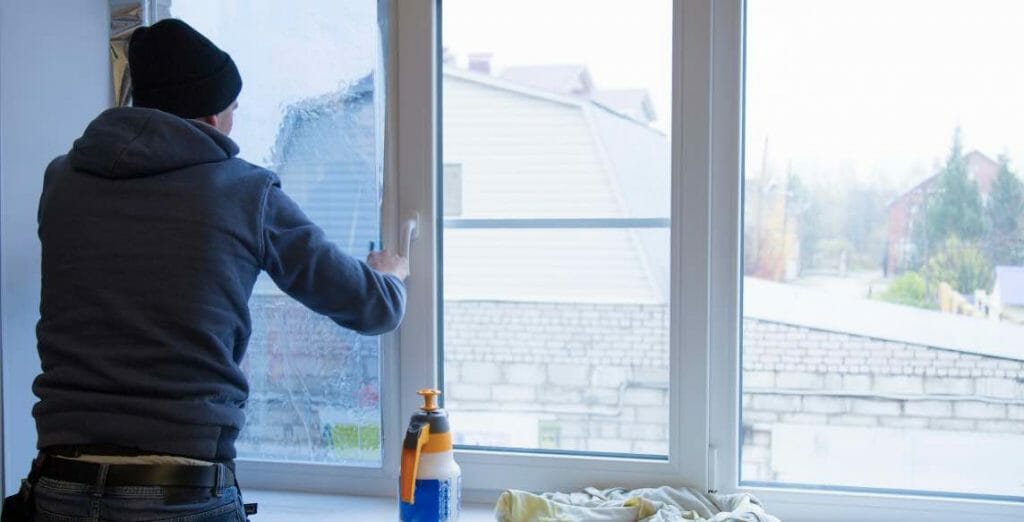
Window films are sheets of durable polyester laminates that have gone through a process in various ways to enhance the look and performance of your existing windows.
Installing privacy films on your windows is extremely handy for daytime privacy during the times when you want your blinds or curtains to be open.
However, people or your neighbor’s security cameras will be able to see through your window when it is dark outside, and your lights are on inside, but you should have your blinds or curtains closed for privacy during those times.
4. Invest in a Powerful Light Facing Towards the Camera Lens
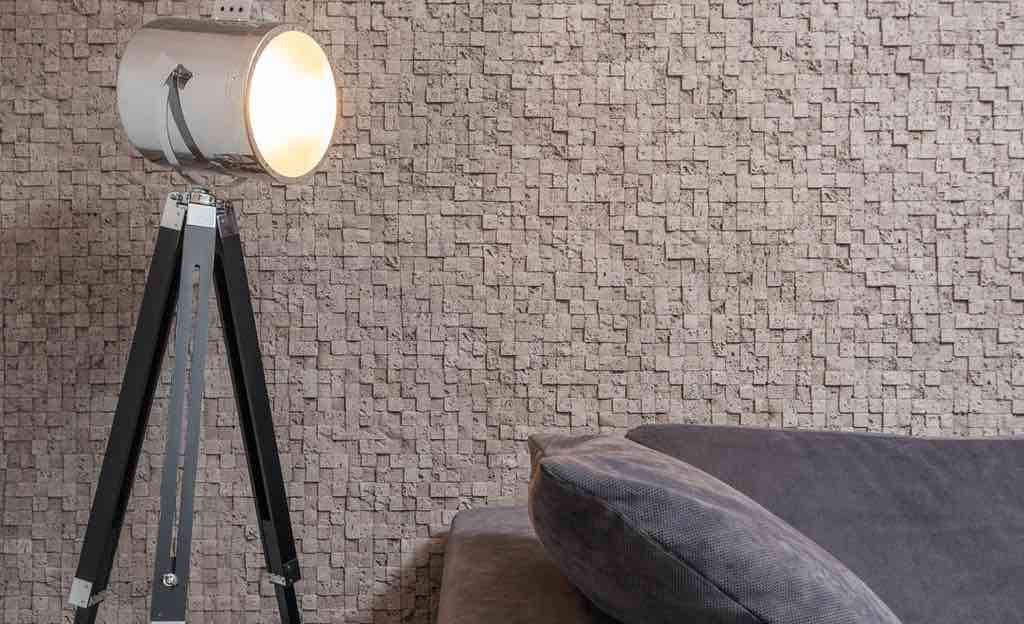
Suppose you don’t want to use blinds or curtains at night for whatever reason. You can purchase an intense light and utilize it instead.
You may use this method to blind your neighbor’s camera without causing damage to it.
If you place an intense light on your property and direct it straight at the security camera, it will blind your neighbor’s security camera at night.
It won’t be helpful during the day, but you should be fine if you have the privacy film indicated above for daytime protection and the nightlight for nighttime privacy.
5. Ask Help from a Third Party or Mediators

If you want to avoid taking harsh actions, this is an essential step to take. Trying to deal with irritating neighbors can be very exhausting.
You can find a mediator through your local community service or mediation center. Just let them know what’s going on, and they’ll take care of it.
The pleasant folks working there are constantly confronted with the same complaints about neighbors and security cameras; they’ll know just what to do.
They frequently arrange mediated meetings between residents and act as a neutral third party in conflicts. Both parties may resolve any significant issues, such as a resident improperly points their security cameras.
6. Contact a Lawyer and the Authorities
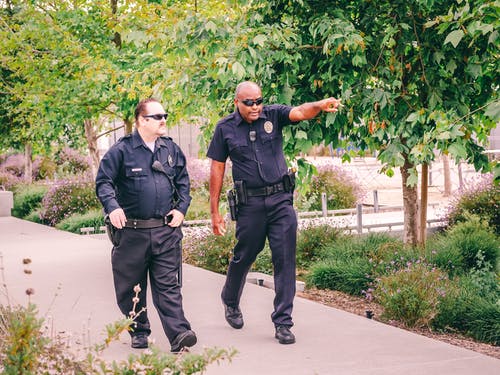
If you’re not sure whether your neighbor is filming security camera footage legally, talk to a lawyer. A lawyer will decide whether the camera is filming your property illegally based on state laws and may even be able to serve them a cease and desist letter which could easily clear up this whole issue. (1)
If this does not help and you have exhausted all your other options you can call the police if you know your neighbor’s camera is directed right into your private spaces within the house.
Every person in a community should not tolerate voyeurism; therefore, we believe you have a legal obligation to report it to the authorities. It is in your best interests to seek guidance from law enforcement officers or talk with an attorney.
You may also ask the authorities to inspect the camera, and if a clear film of your bedroom is visible, your neighbor could face legal repercussions.
7. Invest in a Camera Jammer
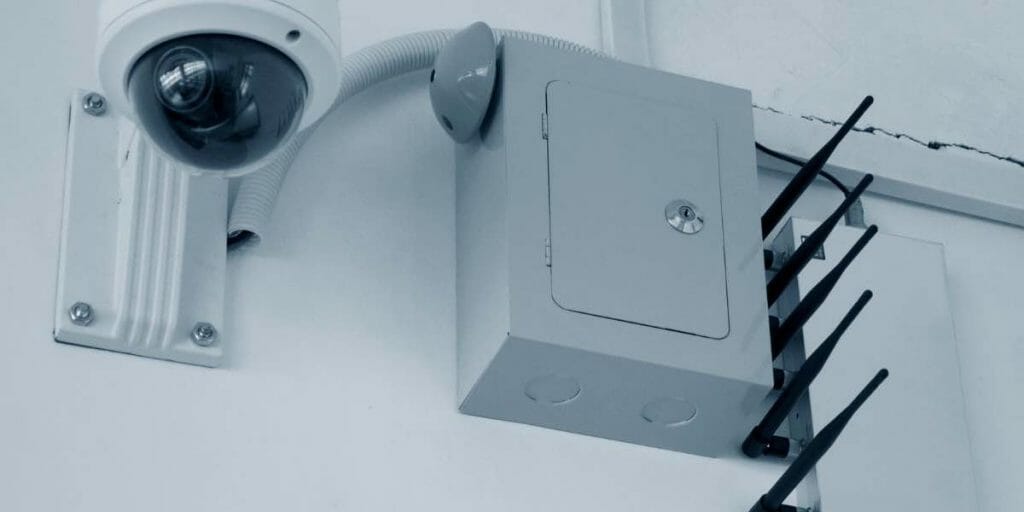
Another method for you is to buy and use a security camera jammer. Through silencing security cameras, the security camera jammer tool can help immediately resolve your uncomfortable problem.
One thing to keep in mind is that these can run into hundreds of dollars and be incredibly expensive. Sometimes it’s an investment we want to make. There are also state-based legality issues for jammers, but as the last option, it could work. There have also been issues of neighbors getting into fights over their camera not working and being jammed but this is the risk you take with something so drastic.
Security camera jammers can block connections and camera filming in your neighbor’s security cameras, allowing you to do whatever you like while keeping your privacy.
These devices are capable of disabling audio/video communications without being noticed. It sends interruption-code frequencies in the 900MHz to 2499 MHz range to break and block the signal of wireless cameras.
A camera jammer will allow you to stop the recording of your neighbor’s security camera quickly. These tools are small and easy to carry, which means you may have one of these in your pocket at all times.
You should also keep in mind that before you use a security camera jammer, you should record the distance between the camera jams.
FAQ
Can you Disable a Security camera With a Laser Pointer?
Yes, cameras are far more sensitive to laser pointers than the human eye. As a result, a laser pointer is invisible to the naked eye yet creates a bright glow that illuminates the security camera lens.
Even modest five mW laser pointers powered by AAA batteries can harm sensors at close range (5-10′), although just a few pixels at a time. The 30,000 mW lasers are likely to destroy sensors faster and in more significant “chunks” of pixels.
Can your Neighbors Point Security Cameras Towards your House?
Sadly, yes is the short and unsatisfactory answer. Your neighbor can monitor their residence with security cameras. In short, the legality of a neighbor’s security camera monitoring your property is solely dependent on three factors: why, how, and what. Why does he point the camera straight at your house, how does he utilize it, and what does your neighbor do with the footage he captures?
You are free to bring a lawsuit against him but the costs could be incredibly high for such a small disturbance. As a result, this should only be considered a last resort.
Moreover, your neighbors are also property owners. You both have the lawful authority to install security cameras to safeguard your property and prevent and scare criminals.
However, there are a few things that you should consider:
- Reasonable Expectation of Privacy
According to security camera laws and federal law, cameras are not allowed to be pointed anywhere where there is a right to privacy. If the camera is recording the inside of your house, it is trespassing your right to privacy. (2)
- Public Spaces
A security camera records public locations or areas that are visible to the public and are generally allowed. It’s allowed, for example, if your neighbor’s camera records the sidewalk and a piece of your yard. Similarly, if their camera view encompasses your front or side yard, visible from the street, it’s okay.
- Audio Recording
Practically, you can’t record someone’s audio without their permission. It’s undoubtedly unlawful if your neighbor’s camera is recording audio. However, the only method to determine if your neighbor’s camera takes audio would be to ask.
How do you Prevent Security Cameras?
As I previously stated, you can avoid your neighbor’s security camera in the following ways:
- Talk to your neighbor
- Plant growing trees and shrubs
- Purchase a camera jammer device
- Install film on your windows
- Buy a powerful light
- Ask for help from a third party or mediator
- Contact the authorities
However, the best solution for you is to talk to your neighbors and ask them to change their camera angle. If they insist, you may try blocking your neighbor’s security camera view with objects, like planting growing trees and shrubs or install films in your windows.
If covering the camera’s view is not enough for your situation. You may try the other methods. Keep in mind that you should consider contacting the authorities as your last resort.
How Can I Cause Interference to Security Cameras?
Improper installation, equipment or power failure, or extreme climatic conditions are the most common causes of security camera interference. Another common cause is a lack of power supply, which is frequently due to poor design or installation.
Whatever difficulty you’re having, there’s always a solution; all you have to do is look at the situation to figure out what’s generating the interference in your camera.
Remember that interference is natural in some scenarios, such as low light, and that the only way to solve this is to use standard or infrared lighting.
Will a Security Camera Work Through a Window?
Sadly, yes, security cameras using a motion sensor that measures pixel changes will indeed be able to spot and film movement through glass or a glass window.
There are two types of motion sensors in security cameras and systems. One is a motion sensor that uses a software algorithm to activate alerts by measuring changes in pixels.
Another type of motion sensor is the PIR motion sensor, which detects body heat and infrared energy to trigger motion alarms.
However, PIR motion sensor security cameras do not work consistently through windows or glass because most glassware used in modern houses nowadays is laminated, restricting heat coming through the glass.
What You Need to Know
The Right of Your Neighbor to Install Security Cameras
Your neighbor is legally permitted to install security cameras on their property for personal safety and video surveillance. Nothing prevents their security cameras from recording your property in their camera’s range of view as long as they are not recording sensitive explicit things.
Most likely, your neighbor’s security camera can’t see anything that a pedestrian going down your street can’t see. As everyone may stroll past your house and see it, there is no reasonable expectation of privacy in your front yard.
However, if your neighbors place their security camera in a way that records the inside of your home, and it may breach your privacy. In this case, you have the right to voice your concern.
The best way is to talk to your neighbor, and if not assessed. You should do the other methods.
Your Privacy Rights
As much as your neighbor has the right to use surveillance camera technology to defend their home, you have the right to privacy within your own home.
Expectations are the primary rule of thumb. When you’re not in a place where you should have a reasonable expectation of privacy when standing in your front yard, your neighbor’s security camera may be filming you legally.
However, if you are sitting in your bedroom, you will have a right to privacy. It is prohibited for anyone to record you without your agreement in this case.
We totally understand that it’s not that simple. Maybe if your house is in the field of view of your neighbor’s security camera and you don’t have any curtains on your windows? There is no reasonable expectation of privacy. Anyone passing by your house may see what’s going on inside your windows. In this case, it does not violate your privacy because your windows are visible to your neighbor’s security camera. All you have to do is hang some curtains.
Suppose your neighbor’s security camera has a wide zoom range and is set in a way that it may record activities in your home that would be difficult to see with the human eye? In this case, you might be able to do anything to get your neighbor’s camera removed. If you suspect your neighbor’s security camera infringes on your right to privacy, you should consult with a lawyer to determine how and where to proceed.
However, in the vast majority of cases, there is no legal infringement. Your neighbor’s security cameras are most likely not breaching your privacy. If you are still concerned about your neighbor’s security camera, there are a few things you can take. Clear communication is essential in this situation.
References
(1) lawyer – https://www.britannica.com/topic/lawyer
(2) right to privacy – https://www.livescience.com/37398-right-to-privacy.html

